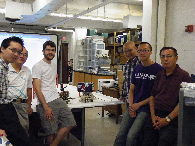Robotics Team wins eighth straight championship
Monday, July 21, 2014
MANHATTAN — The name on the trophy can stay the same — just as it has for the last seven years.
Kansas State University's Robotics Team is again the winner of the American Society of Agricultural and Biological Engineers' annual student robotics design. In fact, since the competition began in 2007, the Kansas State University team has claimed the championship each year.
"We have talented and hard-working students on our team each year, our goal is always high and we always encourage innovative ideas," said Naiqian Zhang, professor of biological and agricultural engineering and the team's adviser.
A little luck helps, too.
"This is our eighth consecutive win, and the number eight in Chinese culture is the most lucky number," Zhang said.
This year's competition was July 14 in Montreal, Quebec, Canada, and was part of the annual international meeting of the American Society of Agricultural and Biological Engineers. Zhang said the province of Quebec is the world's largest maple syrup producer, which was the focus of this year's challenge.
"Collecting the maple sap in a forest is a highly labor-intensive work," Zhang said. "The task for the teams was to develop a robotics system to simulate installations of a sap pipeline between the maple trees irregularly distributed in a forest."
The simulation is done on an 8-by-8-foot board where 12 dowel rods — which represent the maple trees — are randomly assigned in 20 holes. The student-built robotics systems must attach strings to the trees to connect them to one of three collecting points. Points are awarded for the number of trees connected, the total length of the strings and elegance of design. A shorter string length earns more points. The task has to be completed in five minutes and deductions are applied for human assistance.
"We spent a lot of time in brainstorming before starting the robotics systems design," Zhang said. "Our design has always been unique among all the participating teams. This year, we were the only team not to use a 'line-following' technique. Instead, we used a 'monkey swing' idea to move from one tree to another, greatly reducing the path length."
Paying close attention to details in design, fabrication, assembly and testing of the design also pay off for the team each year, as does using the best technology available to them, Zhang said.
The strong support, including financial, the team receives from the biological and agricultural engineering department and the College of Engineering, has been essential, Zhang said, as well as financial support from the AGCO Corp. and Kansas State University's Student Governing Association.
Additional assistance was provided with the team's 3-D printing needs by Eric Wagner, research technician in the department of mechanical and nuclear engineering, and Meng Zhang, a postdoctoral fellow in industrial and manufacturing systems engineering. Assistance from the biological and agricultural engineering department was provided by Joe Harner, professor and department head; Barbara Moore, senior administrative assistant; Jonathan Zeller, research technician; and LouAnn Claassen, administrative assistant.
Team members, all in biological and agricultural engineering, include:
Devin Mengus, master's student, Kanorado; Xu "Kevin" Wang and Yong Wei, both doctoral students, and Youjie Xu, master's student, all from Manhattan; and Jared Barker, May 2014 master's graduate, Topeka.
Justin Frazier, master's student, Tonkawa, Oklahoma, and team captain.
From China: Ruichang Jia, visiting scholar, and Haiyang Liu, doctoral exchange student.

